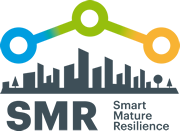About

ABOUT THE
SMR PROJECT
European cities face an increasing frequency and intensity of hazards and disasters, which are exacerbated by climate change and social dynamics, such as demographic change and an ageing population. As Europe’s cities continue to grow, there is an urgent need for far-reaching and holistic approaches to enhance cities’ capacity to resist, absorb, accommodate and recover from the potentially critical effects of hazards. Supporting and building on the nexus of key resilient cities across Europe can create a strong backbone for all of Europe’s cities to support one another in overcoming the challenges arising from risks ahead.
OUR AIM
The Smart Mature Resilience project will deliver a Resilience Management Guideline to support city decision-makers in developing and implementing resilience measures in their cities.
CITIES NEED TO BECOME MORE RESILIENT
European cities are facing an increasing frequency and intensity of hazards and disasters, which are exacerbated by climate change and social dynamics.
A HOLISTIC APPROACH IS ESSENTIAL
Systems within and among cities are interconnected and interdependent. A holistic approach leverages these networks to help strengthen cities in dealing with disasters.
TOOLS ARE PRODUCED TO DEVELOP CITIES' RESILIENCE
The project’s researchers and CITIES co-create tools for city decision-makers to use as part of assessing their cities' resilience maturity and implementing resilience enhancement measures.
OUR PROCESS
Project Management coordinates the project, legal and financial management.
A Survey of Resilience Approaches establishes the project's external context.
Requirements Gathering delivers a careful analysis of issues directly affecting CITIES.
The Resilience Management Guideline is developed following initial findings.
Implementation of the Guideline carries out pilot trials in the core CITIES.
A Resilience Engagement Tool provides a common communication platform.
Standardisation makes project outputs transferable and accessible.
Dissemination and Exploitation maximises the impact of the project results.

This project has received funding from the European Union’s Horizon 2020 research and innovation programme under grant agreement no. 653569.

